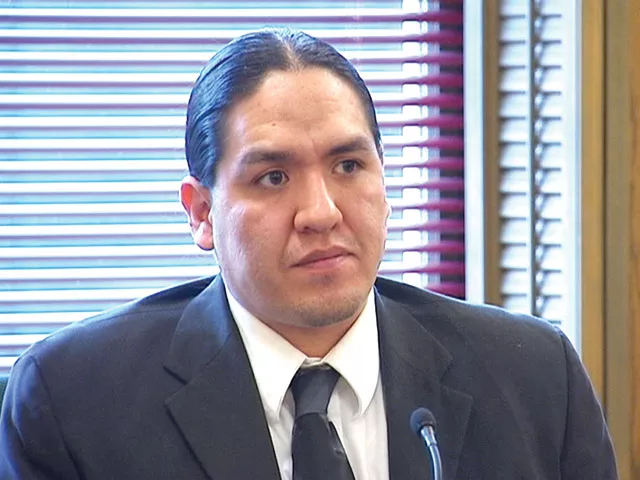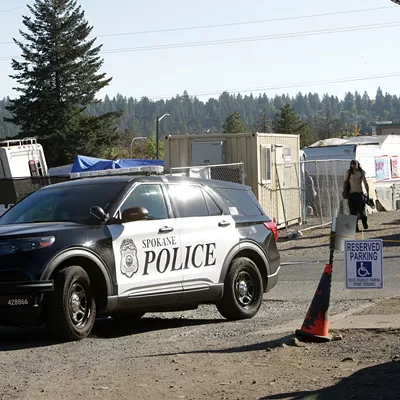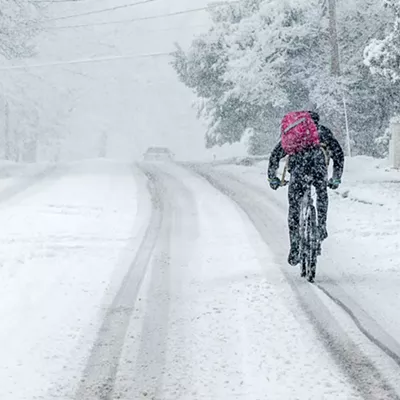The slow dismantling of reality in the case of Jay Olsen versus Shonto Pete continued last week, again at the hands of the judicial system.
This is what is known: Olsen, an off-duty Spokane police officer, shot Pete in the head three years ago after a drunken encounter.
But now — on top of the court’s ruling that Pete did not steal Olsen’s car as alleged, and that even though Olsen did shoot Pete for not stealing his car, he was cleared by a jury — the city is not responsible in any way for the near-fatal mishap. Despite Olsen carrying bullets issued by the police department, and despite his position as a city law enforcer allowing him to conceal the weapon he used with no need for a permit.
The latest fold in the case came last Friday when federal Judge Edward F. Shea ruled in favor of Spokane, saying the city won’t have to pay any civil penalties to Pete in the case.
Olsen, who “resigned in-lieu-of termination,” is still on the hook for the $750,000 claim that Pete is seeking.
“I don’t know what to say,” says Bob Apple, a council member who sits on its public safety committee. “I’ve been appalled at this thing the whole way through. The courts did a great injustice. … There’s the stench of rotting flesh. I smell it. People smell it.”
Apple says he agrees the city is not at fault, but thinks the case has been mishandled at every turn.
“The facts allowed by the prosecutor, the attorneys involved and the court itself were unbelievable,” he says. “The real facts that we all know about were not part of the case.”
Liz Moore, director of the Peace and Justice Action League of Spokane, says the facts lead to the city’s incrimination.
“The city structurally and materially contributed to the situation, by allowing him to have the weapon in the first place, and by issuing him the bullet he shot Shonto with,” she says. “There are patterns, there are individuals trying to hold the city responsible and the city is saying, ‘It’s not our fault, it’s not our fault.’”
Beside Pete’s case, Moore points to the city’s official reaction to the death of Otto Zehm as another example of this “reprehensible pattern.” Zehm, a mentally ill janitor, died after he was beaten with a baton, Taser-ed and hogtied at a Zip Trip by Spokane Police Officer Karl Thompson.
The city maintains that “any injury or damage suffered by Mr. Zehm was caused solely by reason of his conduct and willful resistance.”
But in the case of Pete, says assistant city attorney Rocky Treppiedi, the city actually did nothing wrong.
“Jay Olsen was acting off-duty in this case and did not invoke his arrest powers. … He wasn’t acting as a police officer,” Treppiedi says. “Did the city pay any of his criminal defense? The answer is no.”
But Pete says it was Olsen’s training as an officer that led to the confrontation.
“They trained him to carry a gun at all times,” he says. “He’s supposed to be the law. And when you hold that kind of standard, people are supposed to trust you.”
Now that the city has been taken off the lawsuit, Pete’s unsure what he’ll do next. He still owes $20,000 in medical bills and $18,000 in attorney fees stemming from the incident. He wants to appeal the recent decision and get a new lawyer, one who’s local and whom he can trust.
But until then, he’ll do what he’s done for the last three years: wonder what went wrong.
Olsen “got all his attorneys paid for by the state, and got $150,000 in back pay,” Pete says. “I got stuck with a $40,000 bill.”

























